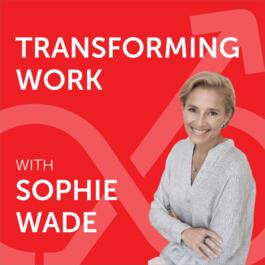
Mark Dixon - Making Offices Work for Today’s Distributed Workforce
Mark Dixon, Founder and CEO of IWG, which he started in 1989 as Regus, discusses workplace evolution and flexible work trends. He shares insights from building IWG’s 18-brand network serving 8 million users across 120+ countries. A serial entrepreneur, Mark shares how evolving workforce needs and digital tools shape location-agnostic office strategies. He emphasizes structuring real estate portfolios to empower employees and align with their work, and critiques outdated RTO policies. Mark discusses reshaping onboarding and productivity practices across roles and generations. He debunks in-office apprenticeships in today’s tech-facilitated world. TAKEAWAYS [01:36] Mark Dixon find school too slow and leaves to start getting involved in business. [02:39] After his first—sandwich—venture, Mark travels the world to gain more experience. [02:59] Mark builds a successful hotdog business, then co-living apartments in Belgium. [03:45] Exploring entrepreneurial opportunities in Europe lays the foundation for IWG. [05:37] Mark’s struggles securing office space in reveals a market need for flexible workspaces. [06:07] On a hunch, the first center opens in 1989, based on simplicity, speed, and outsourcing needs. [07:21] Companies want flexibility, speed, and capital-light solutions—not real estate complications. [09:32] IWG's first clients are mostly large enterprises, while half now are SMEs and entrepreneurs. [10:31] All clients’ reasons are the same: efficiency off the balance sheet with flexibility and speed. [11:19] IWG’s 18 brands offer diverse options from flexible warehouse space to a private members’ club. [13:07] A hospitality mindset is key—providing functioning workspaces with good internet and support. [14:05] Technological advances enable management at distance, where employees have support. [15:32] Workers increasingly self-optimize office usage: hourly, daily, or long-term team project space. [16:50] Good management skills, not location, drives productivity and effective team outcomes. [18:49] More projects and fractionalized work are driving demand for short-term collaboration spaces. [20:58] IWG supports distributed workers and teams globally with platform-like flexible access. [21:23] Businesses shift to convenient offices near where people live to reduce commute strain. [23:30] RTO mandates are based on leaders responding to questions with data support. [24:00] 80% of Fortune 500 companies are becoming more distributed, often providing offices nearer to where people live. [25:22] Virtual onboarding and apprenticeships are effective supported intentionally with technology. [28:45] Workspace purchasing shifts from real estate to procurement, finance, and HR departments. [29:30] Many companies want offices which are convenient for the people they want to hire. [30:00] Organizations are focused on their balance sheet and being capital light and flexible. [31:54] IWG spends significant resources studying work design for customers and IWG employees. [32:48] Design investments encompass tech needs and usage and evolving user expectations. [33:52] IMMEDIATE ACTION TIP: To optimize work and location for outcomes, structure your portfolio, not your policy, and give people the best support for the jobs they are doing. RESOURCES Mark Dixon on LinkedIn IWG’s website Some IWG brands’ websites: Regus, Spaces, HQ workspaces The Hybrid Working Calculator white paper The Future of Work – A trends forecast for 2024 white paper QUOTES “Business people in general understood the value of capital light - focus capital on core business, not on peripheral activities. The value of service. The value of immediacy. I can just take it--the value of flexibility.” “Companies are understanding that they're in the job of supporting people to be more productive. That's the job. They're very focused on their balance sheet. They're very focused on capital light. They're very focused on flexibility.” “In a modern tech-facilitated world, you structure your portfolio, not your policy. It’s not a question of RTO or not—it’s about enabling the best support for the people for the job they’re doing.” “80% of Fortune 500 use us, and the majority of them are moving to a more distributed workplace.” “We used to deal with just property directors. Now we are talking to procurement, human resources. and to finance people.” “Companies are understanding that they're in the job of supporting people to be more productive.”
From "Transforming Work with Sophie Wade"


Comments
Add comment Feedback